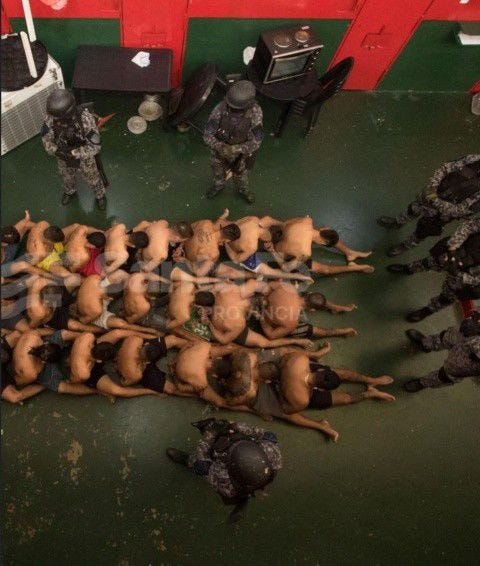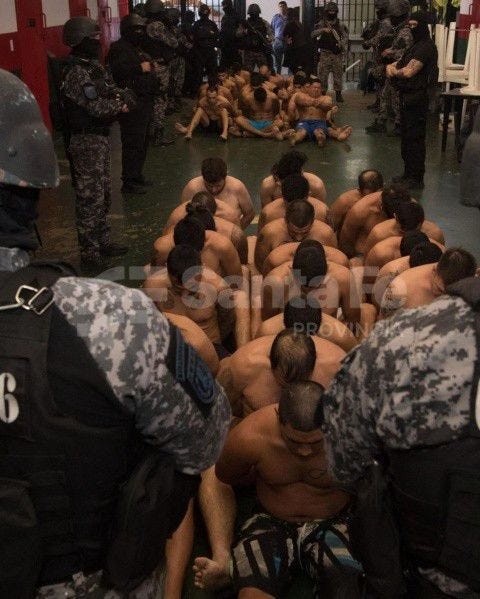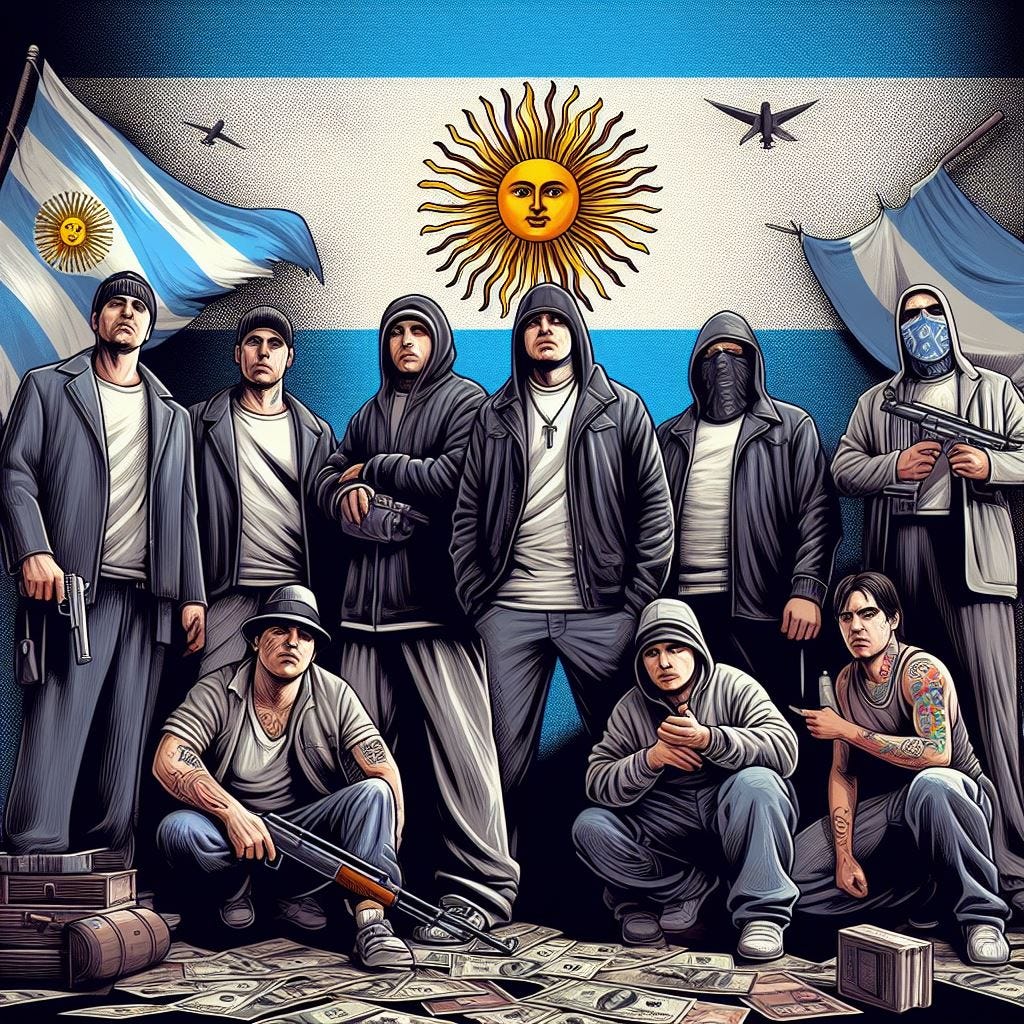Argentine politicians wanted to copycat Bukele: it started a gang war instead
The dark episode illustrates a bloody failure of implementing "the Bukele strategy" in other Latam countries
This week’s absolutely fascinating feature is by OG PWS contributor Paulo Rosas Chávez. We’re thrilled to have him back aboard.
Pirate Wire Services has previously reported on the narco boom in Rosario, Argentina, where sophisticated nacro-gangs have made inroads into the city in recent years. In October 2022, we explained how criminal groups emerged, grew in power, and why they launched a campaign of terror against both the press and politicians.
But in the last week, a spree of murders in the hometown of football star Lionel Messi threw the city into a state of paralysis and full-on panic. But this crime story comes with a shocking twist.
The massive wave of violence may have been caused by a horribly failed attempt by the local government to copy the policies and social media style of Bukele, president of El Salvador and self-described “coolest dictator in the world.”
The details are a little confusing at first glance. That’s why we feel that before we get into the analysis of the story, it’s best to first lay out the terrifying sequence of events chronologically.
Logbook of terror
Tuesday, March 5
Around noon, the Instagram accounts of the Government of Santa Fe, Governor Maximiliano Pullaro and the Minister of Security, Pablo Cococcioni, publish three photographs with the caption "Cada vez la van a pasar peor" and with the song "In the Eye of the Storm" by the heavy metal band Arch Enemy.
The photos show prisoners half-naked and lined up in the same style as Bukele's Salvadoran prisons. They were taken after a series of searches in which "a significant number of cell phones and sharp objects" were found. The message was seemingly directed at prisoners who earlier that week had been convicted of planning orchestrated attacks in Rosario’s prison system.


23:00: Taxi driver Héctor Figueroa arrives in the South Zone of the city to drop off a passenger. Seconds later, nine shots are fired at the 43-year-old driver's vehicle. The father of two, who was planning to marry his partner the next day, dies on the spot. The killers leave a slipper at the crime scene.
Wednesday, March 6
23:00: Taxi driver Diego Celentano arrives in the Southern zone of Rosario to drop off a passenger. Immediately afterwards, the Volkswagen Voyage is shot five times. The 32-year-old driver dies and, next to his body, another slipper is found. There are also 9 mm caliber bullet casings with the initials PSF, associated with the Santa Fe Police. All cab drivers in Rosario announce a work stoppage until further notice.
Thursday, March 7th
19:15: Bus driver Marco Daloia drives through the Western zone of the city. He stops at the intersection of Mendoza and Mexico streets to pick up a passenger. The individual gets on the bus, draws a 380 caliber pistol and shoots the 39 year old driver in the head. The father of three children is taken to a hospital.
22:00: Two men on a motorcycle throw gasoline on a cab parked in the west of the city before setting it ablaze.
22:30: Two subjects on a motorcycle fire four shots at a police station in Zona Sur.
22:55: The union representing public transportation workers in Argentina announces an indefinite work stoppage in Rosales.
Saturday, March 9th
23:40: A hooded man breaks into a gas station in the western district of the city. He enters the attendant's booth and shoots Bruno Bussanich, 25, twice in the chest and once in the head. Bussanich dies a few minutes later. The authorities, upon arrival, discover a note from the assassin. It reads:
"This war is not for territory, it is against Pullaro and Cococcioni. Just as we have reached 300 dead, if we are united we will kill more innocents per year. We don't want cell phones, we want our rights. We want to see our children and family and have them respected. We do not want to negotiate anything. Pullaro and Cococcioni, carry the burden of innocent deaths. Sincerely: North Zone, South Zone, West Zone, united".
Shortly after the killing, gas stations announce that they will close overnight between 22:00 and 6:00.
Sunday, March 10th
13:30: The Clemente Álvarez Emergency Hospital reports the death of Daloia, the bus driver who had been shot 72 hours earlier.
20:50: In different areas of the city, thousands of people from Rosario carry out a "cacerolazo" -banging on the bottom of a pot or pan from a window as an act of protest- against the wave of violence. The demonstration lasts up to 20 minutes in some neighborhoods.
Monday, March 11
The city awakens with no public transport, no cabs, schools closed and almost no commercial activity.
9:00: Argentine President Javier Milei says in an interview that his government "is cornering drugs and drug trafficking" in "a war without quarter". The ultra-right-winger also blames “provincial socialism” for the recent wave of violence. "To have given so much credit to the socialists is not free, everything they touch they destroy".
That same day, the national and local governments announce a state of emergency in Rosario. Minister of Security Patricia Bullrich travels to the city to coordinate deployment of federal security forces to “restore order”.
The forces impose checkpoints in the city, while police organize crackdowns that include mass arrests. However, critics say that militarization alone is unlikely to solve the resurgence in crime in Rosales.
The Fallout
Sergio M. Naymark, a journalist specialized in Police for Radio Universidad Nacional de Rosario, told PWS "this is the eleventh time since 2014 that federal troops have arrived in Rosales.” He says similar deployments in the past have failed to stem the growing power of narco gangs, and that repeating the failed tactics again "will not pacify neighborhoods, but rather to provoke and challenge those who have nothing to lose, who will keep fulfilling orders that, even with all the measures currently imposed inside the prisons, they will continue to receive".
At this point however, one thing is crystal clear: the Bukele copycat measures taken against the drug trafficking prisoners and publicized on Instagram with a heavy metal theme in the background did nothing more than unite the heads of the city’s largest gangs.
Sophisticated criminal groups, who used to war more with one another more than with police, joined forces to paralyze Argentina’s third-largest city in a series of coordinated attacks.
The government strategy backfired so badly that even El Salvador’s Security Minister, Gustavo Villatoro, called Bullrich last Sunday and told her, in a polite tone: "It's a very serious mistake about the photo, they are wrong; you can only do that when the gangs are already neutralized and you have total control of the street"— a dynamic that clearly still has not been achieved in Rosales.
“Without the adequate legal framework and without clear rules of engagement approved by the political power, this plan is madness" - an anonymous retired Argentine General in an interview with the press
Making matters more confusing, military forces have warned that their orders about what they are actually supposed to do are unclear. In an interview with newspaper La Nación, a retired general warned that "there is no clear legal framework to support the intervention of the military in this operation…and their orders are vague”
Naymark explains that "the Armed Forces can really only impose [checkpoints] and help with logistics” since the Argentine Constitution does not allow them to directly engage in policing. “Their presence will be part of a new and repeated staging that will not give more result than a possible temporary decrease in homicides,” he said, noting similar failed efforts in the past.
At the same time, retired military forces recognize, without identifying themselves, that "the ghost of the trials and sentences" for the repression of the military dictatorship of the 70's "is still in force" and that, "without the adequate legal framework and without clear rules of engagement approved by the political power, this plan is madness".
A return to a dark normality?
Since Tuesday, March 12, Rosario has been trying to resume its daily activities. Schools have opened, buses have resumed their activities and cabs are running ever more frequently. Gas stations remain closed during the early hours of the morning. There is a noticeable increase in police forces, especially in the main avenues of the city.
But it is enough to walk a few blocks to realize that things are not back to normal. The recurring topic of conversation is last week's attacks and the danger of walking among empty streets, mainly in the southern and western areas.
For Naymark, until "the conditions of detention of the 'high profile' prisoners inside the prisons are settled, the city will continue to be exposed to any kind of response from the gangs that, with their third or fourth lines still empowered and with a large amount of weapons in their possession, will continue to settle the business of selling drugs with the permission of a certain sector of the police that also plays their game and their business.”
Perhaps more obvious however, copycat policies of a strategy that worked against street gangs in El Salvador who rely on extortion for profits, do not work against more sophisticated narco-traffickers with powerful connections, and police on their payrolls.
The Big Headlines in Latam
Haiti’s Prime Minister, Ariel Henry has agreed to resign. The PM, who is currently trapped in Puerto Rico and unable to return to Haiti due to gang control over roads and airports in the country, agreed to step down and support an interim government after international pressure from Caribbean countries and the U.S.
Chaos in the capital Port-Au-Prince left the city effectively lawless with rebel groups and gangs controlling 80% of the city according to U.N. estimates. Some Haitian lawmakers are calling for plans to deploy a Kenyan-led peacekeeping force to be sped up, and for new elections to be organized as soon as possible.
The country has not gone to the ballot box in nearly a decade.
Colombia’s President Gustavo Petro has called for a Constitutional Referendum after his reform-based agenda has been stymied by legislators. He needs the legislation to approve the measure, which seems…unlikely.
His party’s health care reform bill died in Congress this week, and the president has grown increasingly publicly combative as a result.
Ship’s Business
Joshua’s temporary gig at the Times Latam desk has come to an end, and he is back to feverishly sending pitches in search of the next job. It’s a pirate's life for us! But he is heading back to the Darien Gap at the end of the month for a series of stories for the New Humanitarian.
Daniela, meanwhile, is working on a story about her experience at feminist marches in Bogota on International Women’s Day, that were attacked by police. All of this is to say, it’s a pretty typical week aboard the Good Ship Capybara.
We sail on!
Spanish Word of the Week
Lo suicidaron-
Spanish has a lot more verb tenses than English. It also has a lot more verbs. One example of that verbal wealth is the word suicidar- to commit suicide. Spanish has so many verb forms that you can make dark jokes by playing with grammar!
An example of this is Lo suicidaron. The phrase doesn’t translate exactly into English, but using the plural form, in the sense of me robaron (I was robbed), you can conjugate the verb to mean “he was suicided”— lo suicidaron.
The implication of course being a joke along the lines of, “he committed suicide with two gunshots to the back of the head”. But aside from dark jokes, similar phrases can be used to describe other actions that don’t exist in English grammar.
When someone is forced to resign from their job for example, in Spanish you could say lo resignaron.
Verbs are so cool! And Spanish verbs can make conspiracy theories much, much more entertaining than when they are described in English.
Hasta pronto, piratas!




That photo reminds me of Israeli's subjugating Gaza. The song is terrific alone, but together with that photo reminds me of Americans and Abu Ghraib. Not a winning psy-ops.
I fear for Argentina - poverty begets crime, a spiral hard to control. I know it in my country.
Great story, Paulo. And best wishes to Joshua.